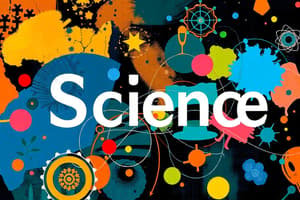Podcast
Questions and Answers
Which branch of science focuses primarily on human behavior and societal interactions?
Which branch of science focuses primarily on human behavior and societal interactions?
- Social Sciences (correct)
- Applied Sciences
- Formal Sciences
- Natural Sciences
Which step in the scientific method involves creating a testable explanation for a scientific question?
Which step in the scientific method involves creating a testable explanation for a scientific question?
- Analysis
- Observation
- Hypothesis (correct)
- Experiment
What aspect is NOT typically associated with applied sciences?
What aspect is NOT typically associated with applied sciences?
- Philosophy (correct)
- Engineering
- Medicine
- Environmental Science
In the context of ethics in science, which value emphasizes the importance of being truthful and transparent in research?
In the context of ethics in science, which value emphasizes the importance of being truthful and transparent in research?
Which of the following subdivisions of formal sciences primarily deals with logical reasoning and argument structure?
Which of the following subdivisions of formal sciences primarily deals with logical reasoning and argument structure?
Study Notes
Definition of Science
- Systematic enterprise that builds and organizes knowledge in the form of testable explanations and predictions about the universe.
Branches of Science
-
Natural Sciences
- Study of the natural world.
- Subdivisions:
- Physics: Study of matter, energy, and their interactions.
- Chemistry: Study of substances and their properties, reactions, and formation.
- Biology: Study of living organisms and life processes.
-
Formal Sciences
- Study of abstract concepts.
- Subdivisions:
- Mathematics: Study of numbers, quantities, and shapes.
- Logic: Study of principles of correct reasoning.
- Computer Science: Study of algorithms, data structures, and computation.
-
Social Sciences
- Study of societies and human behavior.
- Subdivisions:
- Psychology: Study of mind and behavior.
- Sociology: Study of social behavior and societies.
- Economics: Study of production, consumption, and distribution of goods.
-
Applied Sciences
- Use of scientific knowledge to solve practical problems.
- Examples: Engineering, Medicine, Environmental Science.
Scientific Method
- A systematic process for investigating phenomena.
- Observation: Gather information through the senses.
- Question: Identify a problem or curiosity.
- Hypothesis: Propose a testable explanation.
- Experiment: Test the hypothesis through controlled methods.
- Analysis: Examine the results.
- Conclusion: Draw conclusions based on the analysis.
- Repetition: Validate findings through repeated experiments.
Importance of Science
- Drives technological advancements and innovation.
- Provides insights into health, environment, and societal issues.
- Enhances critical thinking and problem-solving skills.
- Fosters curiosity about the world.
Ethics in Science
- Ethical considerations in research and experimentation.
- Importance of honesty, integrity, and transparency.
- Responsibilities towards societal impact and environmental sustainability.
Definition of Science
- Science is a process of building and organizing knowledge about the universe through testable explanations and predictions.
Branches of Science
- Natural Sciences: Study of the natural world
- Physics: Study of matter, energy, and their interactions.
- Chemistry: Study of substances, their properties, reactions, and formation.
- Biology: Study of living organisms and life processes.
- Formal Sciences: Study of abstract concepts
- Mathematics: Study of numbers, quantities, and shapes.
- Logic: Study of principles of correct reasoning.
- Computer Science: Study of algorithms, data structures, and computation.
- Social Sciences: Study of societies and human behavior
- Psychology: Study of the mind and behavior.
- Sociology: Study of social behavior and societies.
- Economics: Study of production, consumption, and distribution of goods.
- Applied Sciences: Use of scientific knowledge to solve practical problems
- Engineering: Applying scientific knowledge to solve engineering problems
- Medicine: Using scientific knowledge to treat illness and promote health.
- Environmental Science: Focuses on the interactions between the physical, chemical, and biological components of the environment.
Scientific Method
- Systematic process for investigating phenomena:
- Observation: Gathering information using the senses.
- Question: Identifying a problem or curiosity.
- Hypothesis: Proposing a testable explanation or prediction.
- Experiment: Testing the hypothesis through controlled methods.
- Analysis: Examining the results of the experiment.
- Conclusion: Drawing conclusions based on the analysis.
- Repetition: Validating findings through repeating experiments.
Importance of Science
- Drives technological advancements and innovation.
- Provides insights into health, environment, and societal issues.
- Enhances critical thinking and problem-solving skills.
- Fosters curiosity about the world.
Ethics in Science
- Ethical considerations are important in research and experimentation.
- Honesty, integrity, and transparency are crucial in scientific research.
- Scientists must be transparent about their methods and results.
- They must be honest with the public about their work and avoid misleading them.
- They must be honest in reporting results and acknowledge any limitations in their research.
- Responsibilities towards societal impact and environmental sustainability must be considered.
- Scientists have a responsibility to use their knowledge for good and to consider the impact of their research on the environment and society.
- Researchers must think about the potential risks and benefits of their research before starting work.
- They should also consider the ethical implications of their work and how it might affect people's lives and the environment.
Studying That Suits You
Use AI to generate personalized quizzes and flashcards to suit your learning preferences.
Description
This quiz explores the definition of science and its various branches, including natural sciences, formal sciences, and social sciences. Each branch encompasses specific fields such as physics, chemistry, and psychology, providing insights into the organization and study of knowledge. Test your understanding of these fundamental concepts in science.




